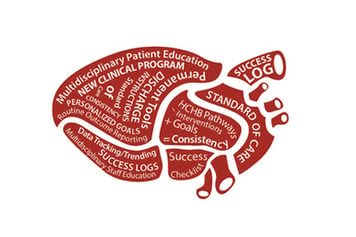Every year, Black History Month serves as a time to celebrate the many contributions of Black Americans to society and to reflect upon our complex history that continues to be written.
We asked our caregivers to offer their thoughts on why it is important to recognize Black history each year. Below are their responses.
Reflections on Black History Month
- “It is important to celebrate Black History Month because you won't have a goal of where you are going if you don't understand the rights and wrongs of the past or where we have been as a nation. Slavery is a part of our history and to not make that mistake you must understand what about it was wrong. Black Americans have contributed to this country's history through inventions, wars, arts, and other areas that make our country great and strong. We are only limited as a country by the lack of unity within the walls of which we live.” – Gail W.
- “Celebrating Black History Month is important because it lets America know that without the past legends like Rosa Parks and Martin Luther King, where would we be today? Black History Month gives the Black community the right to speak their mind that there is help out there and that we are all equal.” – Alarica S.
- “It's an opportunity to focus and celebrate the achievements of African Americans that have contributed to United States under oppression and racism by also empowering our communities to understand how much we are really alike and to remove barriers, encourage dialogues and begin to authentically connect with one another.” – Michelle M.
- “It is important to celebrate who I am and honor the memories and hard work of my ancestors.” – Nikita R.
- ”It is important to celebrate Black History Month to share our history and heritage with other races and ethnicities as well as younger generations that may not have been exposed to many of the challenges that older Black Americans have experienced. It is important that we preserve history for generations to come. As we have seen in recent years there are still challenges and injustices experienced by Black Americans. History tends to repeat itself and we have to understand historical trends and incidents that have occurred in the past in order to confront and address current and future injustices.” – Terrell W.
- “It is amazing to see powerful Black people that have made a difference to our lives. It is also awesome to see how much knowledge and information is shared to encourage all people to start researching and finding out things they never knew about Black history!” – Sherrell H.
- “It is important to celebrate Black History Month because it celebrates diversity. Black History Month goes beyond just recognizing achievements of African Americans, it publicly honors these men and women. It tells their stories in a way that makes us realize how they have impacted our lives and how our lives would not be the same if these individuals did not take risks or sacrifices to accomplish amazing things.” – Kesha H.
- “I believe that knowing, recognizing, and celebrating where we have come from is critical to the evolution of us all. When we recognize & celebrate the innumerable accomplishments of Black people throughout history, we continue to reinforce for ourselves and the next generation what is possible. We give license to dream, and we inspire action for so many others! And in celebrating, we give others an opportunity to learn about the Black experience and create opportunities for discussion, which I believe provide important promise for continued improvements in the sense of belonging people feel in their everyday lives.” – Adam H.
- “It is fundamentally essential that we learn and celebrate our history after all, Black history is American history. The black community has been systematically robbed of our history, culture and genealogy. So, taking time to focus on the contributions, successes along with the trials and tribulations of our community is to show the sheer courage, strength, resilience and profound ability to rise above circumstances to be excellent. It is important to see all that we as a community have achieved despite all that has been against us. Black history is Human History.” – Vanessa L.
Being Black in America
When asked during a 1961 interview about being Black in America, author James Baldwin offered the following response:
“To be a Negro in this country and to be relatively conscious is to be in a state of rage almost all of the time…and part of the rage is this: It isn't only what is happening to you. But it's what's happening all around you and all of the time in the face of the most extraordinary and criminal indifference…”
The pointed accuracy of Baldwin’s assessment still resonates with countless Black Americans. It also represents one of the varied facets there are to the Black experience.
Our caregivers describe what being Black means in the context of their own lived experiences as follows:
- Striving harder to achieve what others take for granted. – Gail W.
- Being overlooked, being judged because of your skin color and wrongfully treated. – Sherlaine C.
- Instilling in my sons that they know that they are valued and loved and that their skin color does not define them. My husband and I are teaching them that there are unfortunately two sets of rules in society that they must govern to survive in America and to return home to us safely and unharmed. – Lisa B.
- Being born with "strikes" against you. – Sherrell H.
- Being true to your core and standing firm in your morals, ethics and principles. Persevering through many obstacles to achieve your goals while remaining positive and motivated. – Nikita R.
- Working hard to open doors previously closed to us, breaking down stereotypes and exhibiting a high level of responsibility for those coming behind you. – Vanessa L.
A Tale of Two Communities
For Christina, being Black in America is a very different experience from her Caribbean upbringing on the diverse island of St. Croix. There, she says, Black History Month was not relegated to the shortest month of the calendar but was something they recognized all year long. “We were supported in celebrating our Blackness.”
Christina moved to the U.S. in 1987 shortly after high school and became all too familiar with the reality of systemic racism. She now worries about how this ongoing issue could negatively impact her children. “I have a Black son and I am very concerned about him being stereotyped and potentially hurt due to the color of his skin.”
Her hope is that with more education and awareness in schools, younger generations will eradicate segregation and discrimination and that Black and brown children will learn to love who they are and be proud of their heritage.
A Lesson in Hope
Like Christina, Adam has a similar hope rooted in the belief that every step forward is one closer to Dr. Martin Luther King’s dream of a nation that judges its citizens on the content of their character, not their race.
His own life serves as a testament to the progress that has been made as the son of a Black father and White mother. “I was born in a hospital far away from my first house because the closer hospitals would not birth a biracial baby.”
“I grew up with incredible family role models who represented every point on the Black and white continuum. And I have experienced how people have moved in the direction from intolerance, to tolerance, to acceptance, to proactive support. We will always have more work to do, but I am hopeful our society will continue in its evolution.”
Heroes Among Us
The 400-plus year history of Black America is laden with stories of both prominent and hidden figures that have changed the course of history and impacted generations of people. We asked our caregivers which Black historical figures have inspired them.
Family Ties
Throughout her life, Sherlaine has taken inspiration from her great grandfather, Willie Peterson Sr., a runaway slave in North Carolina who escaped to freedom and later started one of the first African American pulpwood companies on the eastern shore of Maryland.
---
Other caregivers cited the following as their personal inspirations:
- “Every Black woman and man in America who didn't give up on achieving their dreams. There are many obstacles in one's path that tell us to give up, quit, don't try, you're not good enough, and other statistics that would make us think we can't. Yet despite the odds and our history of not being treated as equals, we still achieve our dreams and reach those seemingly unreachable goals.” – Gail W.
- “All of them, many groundbreaking figures, but if I must choose two, they would be Henrietta Lacks and Harriett Tubman. – Nikita R.
Rosa Parks
- “The reason why she inspires me the most is because not only was she female, but Rosa stood up for her rights to sit at the front of the bus. No matter how hard they tried to move her, she stood her ground and she sat in the front of that bus. She is the reason why we are able to sit anywhere without being moved. She was the first woman to boycott the bus and the mother of freedom movement.” – Alarica S.
- “Rosa Parks inspires me because of her defiance in standing for what was right, in spite of what she was ordered to do. I think about her in many of my trials in life. When something is moral and ethically right, I will stand up for it. I don't just move out of my position because someone asks me to. I evaluate the situation and if I have the right in the situation, I will stand on that.” – Sherrell H.
Dr. Martin Luther King Jr.
“Dr. Martin Luther King Jr. has been an inspiration for me. His steadfast pursuit of justice in a peaceful manner. Dr. King united African Americans and others to address and protest injustices and violence and preached peace and non-violence. Dr. King's message still resonates 55 years after his death.” – Terrell W.
Maya Angelou
“Maya Angelou spoke to me as a strong woman. I remember reading her poems and her words of wisdom about reaching our goals. She was in the trenches and a civil rights activist that worked alongside Malcom X and Martin Luther King and even was not afraid as a woman to help them organize protests. She was not a follower, but a strong leader in her own right.” – Christina P.
Barack Obama
“Barack Obama has inspired me the most in recent years. I heard him speak in person and I was so moved by his words and how his words matched his actions. His presence felt like the living breathing version of Dr. Martin Luther King's dream! His achievements, despite being treated less than, told he couldn't, and the fact he had to work harder than his peers because he was fighting battles they were not, itself is so moving and inspiring. He made me feel like anything is possible because I never thought we would see a Black president in my lifetime. He helped me want more for me and family, to see a future much brighter and bigger than before.” – Vanessa L.



